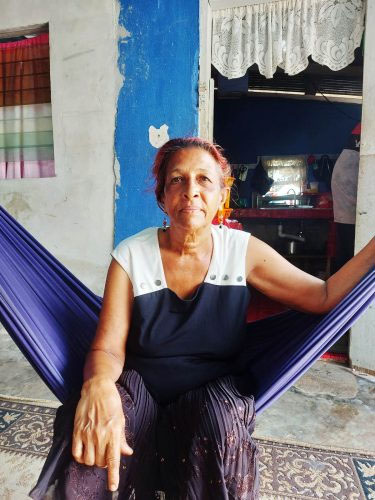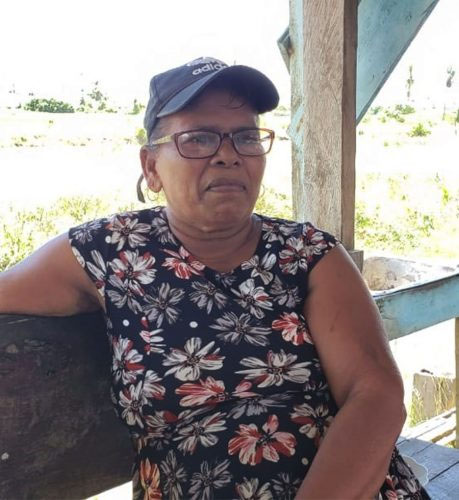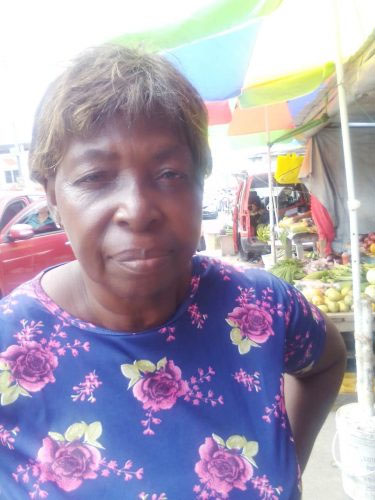 As the cost of living continues to rise, women share today, in their own words, how they ensure their families eat; often, women are the ones who have to make ends meet. Stabroek News has done 86 pieces (tomorrow the 87th piece will be published) on how people are faring with the cost of living. Those interviews are done with people across the country. Below, 12 sisters give their views:
As the cost of living continues to rise, women share today, in their own words, how they ensure their families eat; often, women are the ones who have to make ends meet. Stabroek News has done 86 pieces (tomorrow the 87th piece will be published) on how people are faring with the cost of living. Those interviews are done with people across the country. Below, 12 sisters give their views:
Fay Torres (Riverview, Georgetown) : “The cost of living is affecting me a lot. My child father is working to provide for my son and I. I’m trying to do a side hustle by selling shrimps to buy things for my child in order for him to go to school. The cost for items has gone up in the market. For example, a pound of sugar before cost $100; now a pound of sugar cost $200. A pound of salt a couple months back cost $60; now a pound of salt cost $100. The cost for a big bundle of bora before was $200; now a big bundle bora cost $500 in the market. A seller told me that everything has risen in the market, so she had no choice but to raise the cost for her items too. I would like some kind of help with the rising cost of living.”
 Janki Peter, a 63-year-old vendor (Non-Pareil, East Coast Demerara): “The cost of living is really tough because the cost for everything is expensive. My husband died so I don’t receive assistance anywhere to help with the cost of living. I’m living alone so I find it difficult when paying the utility bills. I have a stall in Bourda Market and I have to pay $2,500 in rent every month. When there are no greens in my garden to harvest, how am I going to get the money to pay my rent? I don’t receive any help from the government to pay my expenses. If I earn an extra income from selling my greens, I would buy a couple chicken and rear it. Well, I don’t have to pay for my medication, I get that from the hospital. The cost for items in the market is high now, for example a five-litre bottle of oil a few months ago cost about $2,300; now the same bottle of oil cost $2,900. Also, a 10 kg bag of Karibee rice before cost about $1,800; now I’m buying the same rice for $2,200/$2,300 at some place. The government should consider reducing the prices on food items.”
Janki Peter, a 63-year-old vendor (Non-Pareil, East Coast Demerara): “The cost of living is really tough because the cost for everything is expensive. My husband died so I don’t receive assistance anywhere to help with the cost of living. I’m living alone so I find it difficult when paying the utility bills. I have a stall in Bourda Market and I have to pay $2,500 in rent every month. When there are no greens in my garden to harvest, how am I going to get the money to pay my rent? I don’t receive any help from the government to pay my expenses. If I earn an extra income from selling my greens, I would buy a couple chicken and rear it. Well, I don’t have to pay for my medication, I get that from the hospital. The cost for items in the market is high now, for example a five-litre bottle of oil a few months ago cost about $2,300; now the same bottle of oil cost $2,900. Also, a 10 kg bag of Karibee rice before cost about $1,800; now I’m buying the same rice for $2,200/$2,300 at some place. The government should consider reducing the prices on food items.”
 Jashwati Rookmin, a 46-year-old single mother (Cummings Lodge and Industry, East Coast Demerara): “Every week when I go to the market to shop, I have noticed that the cost for food items has been increasing rapidly. When I go to the market with $20,000 to buy food items, the next week the same food items will increase by $5,000 more. My daughter and I live together and she is the sole breadwinner for the home. Whatever money we have, we pay the utility bill and buy food items to eat. Example, a few months ago a normal pack of Fernleaf milk cost $680; now the same pack of Fernleaf milk cost almost $800. A couple months ago a medium size cooking oil cost $1,600; now the same bottle of cooking oil cost $1,800. Even a pound of tomatoes is costly still in the market. I would like if the government can provide some kind of support for me since I’m a single mother.”
Jashwati Rookmin, a 46-year-old single mother (Cummings Lodge and Industry, East Coast Demerara): “Every week when I go to the market to shop, I have noticed that the cost for food items has been increasing rapidly. When I go to the market with $20,000 to buy food items, the next week the same food items will increase by $5,000 more. My daughter and I live together and she is the sole breadwinner for the home. Whatever money we have, we pay the utility bill and buy food items to eat. Example, a few months ago a normal pack of Fernleaf milk cost $680; now the same pack of Fernleaf milk cost almost $800. A couple months ago a medium size cooking oil cost $1,600; now the same bottle of cooking oil cost $1,800. Even a pound of tomatoes is costly still in the market. I would like if the government can provide some kind of support for me since I’m a single mother.”
 Yambika Ayana (Lesbeholden, Mibicuri, Johanna and Yakusari in Black Bush Polder): “I normally would collect money from my husband’s NIS every month but still that can’t do to purchase basic food items for myself because everything gone up in the market. As a result of that, I would prepare and sell food for the week in order to maintain myself since everything gone up in the market. Simple items like chicken gone up. A pound of chicken now cost $600 and something; a few months ago a pound of chicken was $240. Also, a pound of celery now cost $2,500; before a pound of celery was sold at a cheaper price. I think the government should work towards lowering the cost for food items.”
Yambika Ayana (Lesbeholden, Mibicuri, Johanna and Yakusari in Black Bush Polder): “I normally would collect money from my husband’s NIS every month but still that can’t do to purchase basic food items for myself because everything gone up in the market. As a result of that, I would prepare and sell food for the week in order to maintain myself since everything gone up in the market. Simple items like chicken gone up. A pound of chicken now cost $600 and something; a few months ago a pound of chicken was $240. Also, a pound of celery now cost $2,500; before a pound of celery was sold at a cheaper price. I think the government should work towards lowering the cost for food items.”
Amanda Rose (Brighton Village, Corentyne): “Right now the price of everything gone up and well it’s hard on us. You can’t afford to buy certain things now to sell back because the price high, so it’s hard on us to make back something. I think if they gave at least vendors, help some vendors to afford to buy stuff would be good. Because when we buy things at a high price and it ain’t selling back we get stuck with it and we not making much of a profit.”
 Marlyn Bailey (Vreed-en-Hoop): “Prices going up every day, cost of living is very hard, especially when you are a single parent, and you have to find food to send the kids to school. As a grandmother who’s taking care of my grandchildren, I have to find snacks for the ones going to nursery and primary school. The prices of things are very, very high. I think that the government should try to control the prices of some items, because look at the price of oil and all these things, things are very expensive. Things are very hard right now. For instance, the past few months, the medium cooking oil was sold at $300 a bottle, then it went to $360 a bottle, now some people sell oil for about $800 a bottle. Even the sugar high. I used to buy sugar for $100 and something for two lbs, now sugar is $200 and $250 a pound. The government should bring the price for sugar down because sugar price hiked up high, and I won’t afford it to make porridge for my grandchildren. Also, right now the stall is the only source that I get my income from, and I had to move my table from the front of my stall, requested by the government. If the government ask us to pay something every week, we as vendors can do that but don’t harass us, because if they take us up from here, what are we going to do? This is the only source of income right now, what are we going to eat?”
Marlyn Bailey (Vreed-en-Hoop): “Prices going up every day, cost of living is very hard, especially when you are a single parent, and you have to find food to send the kids to school. As a grandmother who’s taking care of my grandchildren, I have to find snacks for the ones going to nursery and primary school. The prices of things are very, very high. I think that the government should try to control the prices of some items, because look at the price of oil and all these things, things are very expensive. Things are very hard right now. For instance, the past few months, the medium cooking oil was sold at $300 a bottle, then it went to $360 a bottle, now some people sell oil for about $800 a bottle. Even the sugar high. I used to buy sugar for $100 and something for two lbs, now sugar is $200 and $250 a pound. The government should bring the price for sugar down because sugar price hiked up high, and I won’t afford it to make porridge for my grandchildren. Also, right now the stall is the only source that I get my income from, and I had to move my table from the front of my stall, requested by the government. If the government ask us to pay something every week, we as vendors can do that but don’t harass us, because if they take us up from here, what are we going to do? This is the only source of income right now, what are we going to eat?”
 Sattie Lall, a 67-year-old shop owner (Kuru Kuru, Yarrowkabra and Marudi on the Soesdyke-Linden Highway): “It has been a month or two months now since a bag of sugar did not sell. On top of that, the school closed temporarily so the school children are not around to buy from the shop at the moment, until school reopens and I’m hardly making sales in the shop because of this. If the government can provide some kind of loan for me to mine more chicken that will be a great help to me. Right now I’m mining a couple of creole chickens and ducks but the feed is expensive to maintain them. Right now the feed cost about $6,000 or $7,000 a bag. I know before the price was about $1,000/$1,100 a bag for feed: things really get expensive in the market. I would have to sell pepper sauce to push my business when I’m not receiving sales from other items in my shop. The pepper sauce sales helps me to pay my utility bills. Transportation cost all expensive. A car from the Soesdyke Junction to Yarrowkabra right now cost $1,500, before I used to pay $1,000 to use the car for the same distance. The government is doing well. However, if they could create more jobs for the young people here in Yarrowkabra would be good. The government could consider building a factory here to create jobs for the people, especially for the young people in this community because the cost of living is really hard on everyone in this community.”
Sattie Lall, a 67-year-old shop owner (Kuru Kuru, Yarrowkabra and Marudi on the Soesdyke-Linden Highway): “It has been a month or two months now since a bag of sugar did not sell. On top of that, the school closed temporarily so the school children are not around to buy from the shop at the moment, until school reopens and I’m hardly making sales in the shop because of this. If the government can provide some kind of loan for me to mine more chicken that will be a great help to me. Right now I’m mining a couple of creole chickens and ducks but the feed is expensive to maintain them. Right now the feed cost about $6,000 or $7,000 a bag. I know before the price was about $1,000/$1,100 a bag for feed: things really get expensive in the market. I would have to sell pepper sauce to push my business when I’m not receiving sales from other items in my shop. The pepper sauce sales helps me to pay my utility bills. Transportation cost all expensive. A car from the Soesdyke Junction to Yarrowkabra right now cost $1,500, before I used to pay $1,000 to use the car for the same distance. The government is doing well. However, if they could create more jobs for the young people here in Yarrowkabra would be good. The government could consider building a factory here to create jobs for the people, especially for the young people in this community because the cost of living is really hard on everyone in this community.”
 Helen Warren (Cotton Field, Anna Regina, Essequibo Coast in Region Two): “The rising cost of living is hard on me and my family because I don’t really get money to buy things that I supposed to buy. I’m the only breadwinner in my family of four and them prices for things in the market gone up. The past few months ago, I used to buy four or five boulanger for $200, now boulanger cost two for $500 here. Everything gone up. Before I used to buy two pounds of onions for $100, now a pound of onion is $100; calaloo now is $300 for a small parcel, before two parcels was for $100. I think the government should lower the prices for items in the market because money ain’t deh fuh buy them at the current price. Everything gone up in the market.”
Helen Warren (Cotton Field, Anna Regina, Essequibo Coast in Region Two): “The rising cost of living is hard on me and my family because I don’t really get money to buy things that I supposed to buy. I’m the only breadwinner in my family of four and them prices for things in the market gone up. The past few months ago, I used to buy four or five boulanger for $200, now boulanger cost two for $500 here. Everything gone up. Before I used to buy two pounds of onions for $100, now a pound of onion is $100; calaloo now is $300 for a small parcel, before two parcels was for $100. I think the government should lower the prices for items in the market because money ain’t deh fuh buy them at the current price. Everything gone up in the market.”
 Adeshewa Adekiya (East Bank Demerara): “The cost of living lately has been high, especially food items like tomatoes. A few months back a lb of tomatoes was $180 and $200 then there was a point when it increased to $500 a lb and it was really hard. For instance, to rent a one-bedroom unfurnished studio apartment now is $40,000 per month; before it was $25,000 and $30,000 per month. I don’t know if the house owners are increasing the price based on greed or something or the building material expensive or something. I don’t know why they are increasing the prices of things but whatever reason it is, I feel the price should come down because things are very expensive now. People should consider the fact that they have a large amount of foreign students that are trying to live, and manage with studying at the same time. They should try to bring the cost of living down.”
Adeshewa Adekiya (East Bank Demerara): “The cost of living lately has been high, especially food items like tomatoes. A few months back a lb of tomatoes was $180 and $200 then there was a point when it increased to $500 a lb and it was really hard. For instance, to rent a one-bedroom unfurnished studio apartment now is $40,000 per month; before it was $25,000 and $30,000 per month. I don’t know if the house owners are increasing the price based on greed or something or the building material expensive or something. I don’t know why they are increasing the prices of things but whatever reason it is, I feel the price should come down because things are very expensive now. People should consider the fact that they have a large amount of foreign students that are trying to live, and manage with studying at the same time. They should try to bring the cost of living down.”
 Angela (D’Urban Street): “To be honest our money have no value because when you go to Georgetown with $5,000 to buy food items, you only get to buy a few items versus before when you could have buy more grocery for your $5,000. For example, four boulanger now cost $400/$500; before the cost was $300 for four boulanger. Also, a pound of cabbage cost $500/$400 now; before I could have gotten three pounds of cabbage for $300. Even the cost per pound of tomatoes gone up. A pound of tomatoes now cost $1,000; before a pound of tomatoes cost $300. Also, transportation gone up. Imagine the family who have three children travelling every day to go to school and the transportation cost high. I’m a family of five persons and groceries for my family cost about $70,000 now; before we used to spend about $30,000. I think the government should promote more local items because the imported items when taxed is very costly now.”
Angela (D’Urban Street): “To be honest our money have no value because when you go to Georgetown with $5,000 to buy food items, you only get to buy a few items versus before when you could have buy more grocery for your $5,000. For example, four boulanger now cost $400/$500; before the cost was $300 for four boulanger. Also, a pound of cabbage cost $500/$400 now; before I could have gotten three pounds of cabbage for $300. Even the cost per pound of tomatoes gone up. A pound of tomatoes now cost $1,000; before a pound of tomatoes cost $300. Also, transportation gone up. Imagine the family who have three children travelling every day to go to school and the transportation cost high. I’m a family of five persons and groceries for my family cost about $70,000 now; before we used to spend about $30,000. I think the government should promote more local items because the imported items when taxed is very costly now.”
 Onika Valladares, a 22-year-old public servant (Amelia’s Ward and Mackenzie in Linden, Region Ten): “I’m working part-time with the government and yes all items have gone up in the market. It’s difficult for me because not everything I can buy since my salary is not enough to buy items I need, so my family would help me sometimes to buy items I need for myself. I would mostly depend on my parents for financial support. Vegetables, stationery, groceries, hair food – everything gone up in the market. For instance, a three-litre bottle of oil cost $2,000 and something now; before the cost was cheaper. Also, a sack of sugar cost $1,800 now; before the cost was cheaper. Even hair gel expensive; a small bottle cost $800 now and the price has been this way for a while. I think the government should reduce some of the cost items are sold for in the market because the people’s salary is not enough to buy items they need.”
Onika Valladares, a 22-year-old public servant (Amelia’s Ward and Mackenzie in Linden, Region Ten): “I’m working part-time with the government and yes all items have gone up in the market. It’s difficult for me because not everything I can buy since my salary is not enough to buy items I need, so my family would help me sometimes to buy items I need for myself. I would mostly depend on my parents for financial support. Vegetables, stationery, groceries, hair food – everything gone up in the market. For instance, a three-litre bottle of oil cost $2,000 and something now; before the cost was cheaper. Also, a sack of sugar cost $1,800 now; before the cost was cheaper. Even hair gel expensive; a small bottle cost $800 now and the price has been this way for a while. I think the government should reduce some of the cost items are sold for in the market because the people’s salary is not enough to buy items they need.”
 Hemwantie Latchman (Independence Street and La Parfaite Harmonie Housing Scheme, West Bank Demerara): “Everything gone up in the market because when I go to the supermarket, I see that food items are rising but people’s salary is not rising. When I need the items, despite it is expensive in the supermarket, I still buy them because I need the items for my family. All seasoning, milk, rice; everything gone up in the marketplace. For example, a small sack of Karibee rice cost $2,000 now; before the cost was $1,800. A pound pack Milex milk cost $980 now; before the cost was $600 and something. Even chicken expensive: a pound of chicken now cost $500; before a pound of chicken was $380.”
Hemwantie Latchman (Independence Street and La Parfaite Harmonie Housing Scheme, West Bank Demerara): “Everything gone up in the market because when I go to the supermarket, I see that food items are rising but people’s salary is not rising. When I need the items, despite it is expensive in the supermarket, I still buy them because I need the items for my family. All seasoning, milk, rice; everything gone up in the marketplace. For example, a small sack of Karibee rice cost $2,000 now; before the cost was $1,800. A pound pack Milex milk cost $980 now; before the cost was $600 and something. Even chicken expensive: a pound of chicken now cost $500; before a pound of chicken was $380.”







